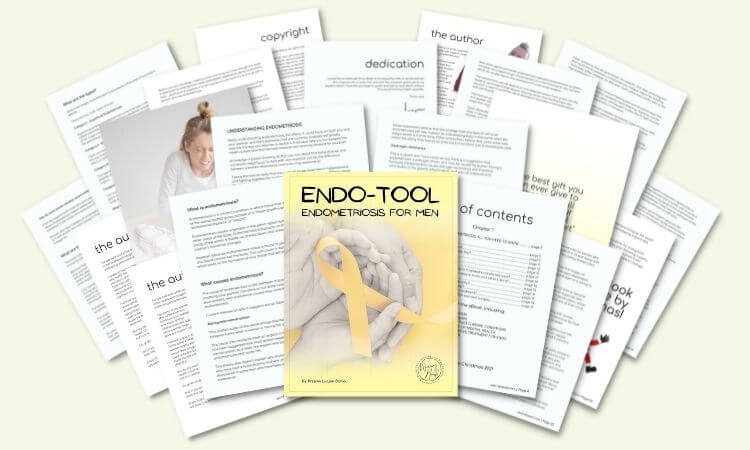How Husbands Can Provide Emotional Support with Endometriosis?
Let’s find out how husbands can provide emotional support with endometriosis. Let me share with you a quick answer, and then you can scroll down for more in-depth answers…
Husbands can provide emotional support to partners with endometriosis by actively listening, offering empathy, and educating themselves about the condition. Accompanying them to medical appointments and helping with household tasks can also alleviate the physical and emotional burdens associated with endometriosis.
- How Husbands Can Provide Emotional Support with Endometriosis?
- Understanding Endometriosis and Its Impact on Relationships
- Recognizing the Emotional Burden on Male Partners
- Effective Communication: A Foundation for Emotional Support
- The Role of Husbands in Managing Daily Challenges with Endometriosis
- How Husbands Can Support During Medical Consultations and Treatments
- Maintaining Intimacy and Connection Despite Physical Pain
- Offering Encouragement and Strength Through Diagnostic and Treatment Phases
- Handling Infertility Challenges Together
- Cultivating a Nurturing Relationship Despite Endometriosis
- Finding External Avenues of Support
- The Psychological Effects of Endometriosis on Both Partners
How Husbands Can Provide Emotional Support with Endometriosis?
When you and your spouse face endometriosis, the road ahead might seem daunting. The physical affliction borne by your partner often conceals an emotional odyssey for both of you. But, as husbands, your role in providing emotional support can be the keystone of a nurturing relationship through these trials. It’s not just about being there, it’s about being engaged, understanding, and empathetic.
Empathy and understanding are your guiding stars as you navigate this journey together. Endometriosis, with its unpredictable ebbs and flows, not only affects the person who has it but also casts a profound impact on you as a husband. Knowing how essential your support for husbands in similar situations is, there’s an unspoken bond, a shared resolve to offer whatever comfort you can.
Consider your involvement a sanctuary of strength and resilience for your partner, a testament to the nurturing relationship that endures, adapts, and grows in the face of adversity. Grounding your connection with emotional support is a pledge of true companionship, a promise to be a pillar in times when strength is most needed.
If you want to learn more about endometriosis, I wrote an “Endo-Tool, Endometriosis for Men” e-Book.
You can get the 1st Chapter of the e-Book for FREE, and if you like it, you’ll get a Whopping 33% Discount on the Whole Book, plus discounts on other helpful tools. You have nothing to lose but a lot to gain!
The first chapter alone contains all the comprehensive medical knowledge about endometriosis, including:
- What is endometriosis?
- What are the symptoms?
- What causes endometriosis?
- What does endometriosis look like?
- What are the stages?
- What are the types?
- What is adenomyosis and how is it related to endometriosis?
- Why do some women develop severe endo and others don’t?
- Does endometriosis cause infertility?
- How is endometriosis diagnosed?
- Do types and stages affect the treatment?
- Recurrence of endometriosis after excision surgery.
FREE Chapter of “Endo-Tool”
Endometriosis e-Book for Men

Understanding Endometriosis and Its Impact on Relationships
When you delve into the world of endometriosis, you encounter not just a physical ailment, but a condition that weaves its way through the very fabric of your relationships. Understanding endometriosis is essential—it’s a condition that affects a significant number of women, casting a net of challenges that can strain even the strongest of bonds. As a supportive spouse, recognizing the emotional toll it takes on both partners is instrumental in navigating the journey together.
The Emotional Toll of Chronic Conditions on Partners
Endometriosis isn’t a struggle faced in isolation; it’s a shared experience, colored by a spectrum of emotions from both partners. For you as a spouse, coping with endometriosis in your relationship often means seeing your loved one in pain and feeling frustration or worry. This emotional toll is real and significant, and your empathetic understanding is a powerful tool in managing this chronic condition’s day-to-day realities.
Navigating Intimacy Challenges with Compassion
Intimacy is one of the pillars of a strong relationship, yet it’s one of the aspects most impacted by endometriosis. It demands a delicate balance, a tenderness that acknowledges both the physical and emotional challenges at play. Dyspareunia, or painful intercourse, is one such hurdle, and navigating intimacy with compassion means being open to exploring new ways to maintain your connection without exacerbating pain.
The Importance of a Supportive Spouse in Coping with Illness
Your role as a supportive spouse is critical—not just in handling the logistics of healthcare decisions but in fostering an environment of mutual understanding. The journey includes accompanying doctor visits, providing comfort after tough days, and most importantly, maintaining dialogue. As a couple, you grow by embracing the nuances of coping with endometriosis, drawing from each other’s strengths to rise above the challenges.
Recognizing the Emotional Burden on Male Partners
When it comes to providing emotional support for partners with endometriosis, it’s crucial to consider the emotional burden that falls on you, as male partners. Your role in the emotional tapestry of managing this condition is significant, yet often underrecognized. Frustration, helplessness, and anger can be frequent visitors in your emotional landscape, pointing to the need for better support for husbands.
Insights from research, like the ENDOPART study, underline that emotional support for husbands is not merely an act of kindness but a necessity. By acknowledging the emotional burden you carry, society can take a step towards offering more comprehensive care, which includes your well-being as well. It’s about shifting the focus and recognizing that husbands’ role in the journey through endometriosis care is a cornerstone for building a nurturing and resilient relationship.
It’s essential to understand that your experiences and needs are valid, deserved of attention, and critical for the health of your relationship. You are not alone in this, and it’s time that the emotional burden shouldered by husbands and male partners becomes a focal point of conversation and action. Below is a guide that may help in navigating the complex emotions and expectations placed upon you.
- Seek understanding: Recognizing that emotional labor is part of supporting a partner with endometriosis is the first step in validating your feelings.
- Ask for support: Don’t hesitate to reach out for help, whether it’s through counseling, support groups, or even just talking with friends and family. You need a support system, too.
- Communicate openly: Sharing your feelings with your partner can strengthen your relationship and provide mutual emotional support.
Addressing the absence of recognition for the emotional toll on male partners is not only beneficial for your mental health but also for the well-being of your partner with endometriosis. Effective emotional support is a true partnership, and husbands play a critical role. Remember, support for husbands is not a luxury but an integral part of the care narrative for endometriosis.
Effective Communication: A Foundation for Emotional Support
As you stand beside your partner through their endometriosis journey, your capacity to engage in effective communication is the anchor of emotional support. Crafting a safe space for dialogue not only elevates the quality of your relationship but also fortifies the support system essential for both of you during this time.

Encouraging Openness and Honesty in Sharing Feelings
The cornerstone of effective communication within a relationship is openness. Inviting your partner to share their thoughts and feelings openly, without fear of judgment, is key. It’s not just about speaking openly but also about listening actively. Your encouragement of honesty will not only help them articulate their needs but also enable you to understand and provide the emotional support they crave.
Understanding Non-Verbal Cues and Emotional Needs
Emotional support extends beyond the spoken word. Understanding non-verbal cues — a gentle squeeze of the hand, a prolonged hug, or even a knowing glance — can speak volumes about your partner’s emotional needs. Being attuned to these silent messages allows you to respond with the empathy and understanding that fortifies your role in providing emotional support and solidifies trust and intimacy in your relationship.
The Role of Husbands in Managing Daily Challenges with Endometriosis
As husbands, you are fundamental in managing daily challenges tied to your partner’s endometriosis. Your role extends beyond companionship to include practical assistance and active participation in healthcare decisions. Understanding and undertaking this dual aspect of support can alleviate pressure from your partner and contribute to a harmonious home environment.
Providing Practical Assistance in Day-to-Day Activities
Your partner may face difficulties completing everyday tasks due to the symptoms of endometriosis. Helping out with household chores, taking care of groceries, or preparing meals can offer much-needed relief.
Here’s a table detailing how you can assist in daily activities:
| Activity | How to Assist |
|---|---|
| House Cleaning | Take on certain tasks such as vacuuming or doing the laundry. |
| Grocery Shopping | Handle the shopping list or go to the supermarket yourself. |
| Cooking | Prepare meals or arrange for healthy take-out options. |
| Child Care | Take a more active role in tending to your children’s daily needs. |
| Appointment Scheduling | Manage medical appointments and keep a shared calendar. |
Participating in Healthcare and Treatment Decisions
In endometriosis management, participating in healthcare decisions is essential for both you and your partner. It would help if you aimed to attend key medical appointments and discuss treatment options together. Being well-informed will allow you to give valuable input during consultations and help form a united front when deciding on potential treatment paths.
Remember, your involvement makes a significant difference. By staying informed and playing an active role in treatment decisions, you reinforce the partnership with your spouse and together, can more effectively navigate the road to better health and well-being.
How Husbands Can Support During Medical Consultations and Treatments
When your partner is facing medical consultations and treatments for endometriosis, your role as a husband extends beyond the comforts of home. Your involvement during medical appointments can be just as crucial as the emotional support you offer on a daily basis. Understanding the specifics of the condition and preparedness to discuss various treatment options with healthcare providers can significantly ease your partner’s stress and contribute to informed decision-making.

By being present and attentive, you provide a pillar of strength and advocacy for your partner, which is imperative during moments when they may feel vulnerable or overwhelmed. Here’s how you can actively support your partner:
- Learn about endometriosis — its symptoms, treatment options, and potential impact on quality of life.
- Accompany your partner to appointments, signaling that her concerns are valid and important.
- Help with taking notes during consultations to ensure all information is remembered and understood.
- Engage with doctors and specialists, asking pertinent questions and discussing treatment support strategies.
- Offer emotional support by holding your partner’s hand, making eye contact, and providing reassurance.
Medical journeys can be complex, often requiring tough decisions about treatment paths. As a husband, your role can be instrumental in alleviating the pressures that come with such choices. With your informed presence and empathetic engagement, you improve communication with healthcare providers and help forge a path that best supports your partner’s health and well-being.
Remember, your involvement symbolizes a united front, showcasing your tireless commitment to supporting a partner through the arduous journey of managing endometriosis. So, step into these moments with confidence, armed with knowledge, and a heart full of support, ready to face whatever comes your way, together.
Maintaining Intimacy and Connection Despite Physical Pain
When you or your partner are dealing with the challenges of endometriosis, maintaining intimacy in your relationship takes on unique complexities. Together, it’s essential to recognize that intimacy isn’t solely defined by sexual activity; it’s also about the emotional and physical closeness that you share. By understanding the psychological impact of dyspareunia and exploring alternative ways to express affection, you can protect the connection that keeps your relationship strong, even in the face of pain.
Understanding the Psychological Impact of Dyspareunia
The experience of painful intercourse is not just a physical issue; its repercussions echo into the psychological well-being of both partners. It’s common for both individuals to feel a range of emotions, from frustration to sadness, which can lead to emotional distress and affect the overall quality of the relationship. Recognizing this impact is the first step towards mitigating its effects and keeping your bond intact.
Exploring Alternative Ways to Express Affection
To nurture your connection despite pain, it becomes necessary to think beyond traditional notions of intimacy. Open discussions with your partner about alternative forms of affection such as cuddling, holding hands, and sharing tender words, can create new pathways to maintain the closeness you both cherish. Here are some alternative affectionate activities you might consider:
- Massage – a way to provide comfort and show care without pressure
- Quality time – focused, uninterrupted time spent together, whether in quiet conversation or shared activities
- Words of affirmation – verbal expressions of love, appreciation, and support
Each couple is different, and the key is to find what resonates most with you as you navigate the intimate relationship challenges brought on by endometriosis. As you embrace these alternative affections, the emotional ties of your relationship can continue to thrive, maintaining intimacy even when sexual activity may be limited.
Offering Encouragement and Strength Through Diagnostic and Treatment Phases
As your partner faces the complexities of endometriosis, your role in offering encouragement and support is invaluable. The journey from the first signs of this condition to an accurate diagnosis demands determination, and your involvement is crucial. During the treatment phase, your unwavering presence provides the emotional fortitude needed for both surgical and recovery periods. Become the beacon of hope and support, redefining resilience every step of the way.
Assisting in the Journey to Diagnosis
Assisting in diagnosis is more than accompanying your loved one to medical appointments—it’s about actively engaging with healthcare professionals, advocating for your partner, and ensuring that their symptoms are taken seriously. By being informed and prepared for each consultation, you help illuminate the path toward the right diagnosis. Your advocacy accelerates this diagnostic phase and can significantly shorten the journey towards effective treatment options.
Support During Surgical Procedures and Recovery
Your support during surgery is a testament to your commitment. As your partner undergoes procedures such as laparoscopic surgery, your strength becomes their comfort. In the following recovery phase, your thoughtful care can profoundly impact their healing process. From preparing nutritious meals to managing medication schedules, your assistance is a tangible form of love and encouragement.
Embrace the opportunity to provide solace during these trying times. Your unwavering dedication not only aids in navigating the healthcare system but embodies the deep emotional connection that transcends the trials of endometriosis. Offer encouragement and let your partner feel the strength of your join resolve. While this journey may not be easy, together, you can face each phase with hope and tenacity.
| Phase | Role of Support | Impact on Partner |
|---|---|---|
| Diagnostic | Advocacy, Research, Preparing Questions for Consultations | Increased Confidence, Reduced Anxiety |
| Treatment | Attending Appointments, Understanding Treatment Plans | Feeling of Alliance, Informed Decision-Making |
| Surgery | Emotional Presence, Coordinating Care | Decreased Sense of Isolation, Enhanced Recovery |
| Recovery | Practical Home Care, Encouragement | Improved Healing, Emotional Resilience |
Handling Infertility Challenges Together
When facing the specter of infertility as a consequence of endometriosis, it is essential to recognize the emotional and psychological weight it can add to your relationship. Triumphing over these challenges necessitates mutual understanding, sensitivity, and sustained support. Let’s focus on how you and your partner can unite in this journey, fostering open conversations about family planning and thoroughly exploring fertility treatment options available to you.
Engaging in Open Conversations About Family Planning
It’s no surprise that discussions around starting or expanding your family can be tinged with anxiety, especially when dealing with endometriosis. However, open communication is critical. By cultivating a safe space for dialogue, you both can voice your deepest concerns and desires about family planning. These conversations are integral in aligning your dreams and expectations.
Supporting Each Other Through Fertility Treatment Options
As you sift through the myriad of fertility treatment options, remember that it’s not just a journey—it’s a partnership in every sense. From understanding the nuances of laparoscopic deep excision surgery to considering assisted reproductive technologies like IVF, a supportive approach towards each other is what makes navigating these options less overwhelming. Together, you can make decisions that resonate with both your wellness and parental aspirations.
Cultivating a Nurturing Relationship Despite Endometriosis
Living with endometriosis isn’t just about managing physical symptoms. It’s about nurturing a bond that remains unbreakable in the face of adversity. As couples with endometriosis, you must traverse a terrain that demands resilience, patience, and abundant emotional support. The silver lining? These challenges often lead to stronger relationships, carved out of mutual understanding and husband’s support that form the bedrock of enduring love and companionship. Recognize that your journey is as much about cultivating a strong connection as it is about health management.
Imagine your relationship as a garden. It needs consistent care and attention to flourish, even more so in harsh conditions. Endometriosis may bring storms and unpredictable weather, but your commitment to each other is your garden’s shelter. Here’s how you can foster this growth:
- Be the patient gardener, understanding that some days will feel like a setback. Your partner’s pain is not a reflection of your nurturing, but an external challenge to weather together.
- Show empathy with your actions and words. Navigating endometriosis takes a physical toll, but emotional wounds need healing too. Your empathy lays the ground for further emotional support.
- Open yourself to understanding and communicating about the complexities of endometriosis. This shared knowledge can be a powerful tool in maintaining a nurturing relationship.
Remember, you’re not just focusing on weathering the storm; you’re learning to dance in the rain. Every act of kindness, every moment of support, every shared experience is a step towards a strengthened bond. A husband’s support can make all the difference, ensuring that together, you grow a garden that can withstand the seasons, and perhaps, even blossom more beautifully than you imagined. So take hands, and with each passing day, reinforce the nurturing relationship that you’ve vowed to cherish and protect.
Finding External Avenues of Support
When it comes to knowing how husbands can provide emotional support with endometriosis, support groups come in handy!
When navigating the challenges of endometriosis, you and your partner need not face them alone. Apart from one another’s undying support within your relationship, external support avenues can offer a much-needed respite and additional strength. Delve into the world of support groups and professional help, and discover how these resources can bolster your capacity to manage the condition together.
Connecting with Support Groups for Partners
The journey of endometriosis is complex, and sometimes, the most profound understanding comes from those who walk a similar path. Support groups provide a sanctuary for partners to share experiences and wisdom. Engaging with others who face the same battles fosters a sense of community and normalizes your struggles, making the everyday challenges a shared experience, rather than a solitary fight.
- Find comfort in collective wisdom.
- Experience a sense of belonging by sharing your journey.
- Learn new coping strategies from peers.
Seeking Professional Help When Needed
There are times when the weight of emotional turbulence demands professional intervention. Don’t hesitate to seek therapy or counseling to navigate relationship strains or personal emotional turmoil. A professional can provide tailored guidance to help you and your partner find balance and peace amid the chaos of managing a chronic condition like endometriosis.
- Consider individual therapy for personal coping strategies.
- Explore couples’ counseling for joint support and communication enhancement.
- Recognize when professional help can be a cornerstone of ongoing resilience.
Embrace these external support groups and professional help as vital components of your support ecosystem. With these avenues of support, you’ll find additional layers of understanding and guidance to supplement the love and care you provide each other every day.
The Psychological Effects of Endometriosis on Both Partners
Endometriosis is a condition that doesn’t just affect the body; it also bears significant psychological effects. As you and your partner navigate through this challenging journey, it’s essential to acknowledge and address the complex emotions entwined with this condition. Understanding the scope of these emotions can empower both of you to offer mutual support and reinforce your bond.
Addressing Feelings of Guilt, Helplessness, and Anxiety
As a partner to someone with endometriosis, you may find that feelings of guilt, helplessness, and anxiety often arise. You are not alone in this experience. Many individuals feel burdened by a sense of guilt for the challenges their partner endures daily, while simultaneously battling feelings of helplessness at not being able to alleviate their loved one’s pain. This is when fostering open communication becomes vital in managing anxiety effectively and creating a supportive environment where both partners can heal and grow stronger together.
Fostering Resilience and Emotional Strength Together
Building resilience as a couple is a crucial step in contending with the psychosocial impact of endometriosis. It’s about more than just getting through the day; it’s about fostering a relationship that is both empathetic and robust. Together, you can work towards emotional strength by actively supporting each other, acknowledging each other’s struggles, and embracing each challenge as a unified front.
Remember, the power of a resilient relationship lies in its capacity to transform adversity into a deeper, more connected partnership. And if you want to express your opinion about how husbands can provide emotional support with endometriosis, do share it in the comments section below!


About Me
Hi, I’m Lucjan! The reason why I decided to create this blog was my beautiful wife, who experienced a lot of pain in life, but also the lack of information about endometriosis and fibromyalgia for men…
